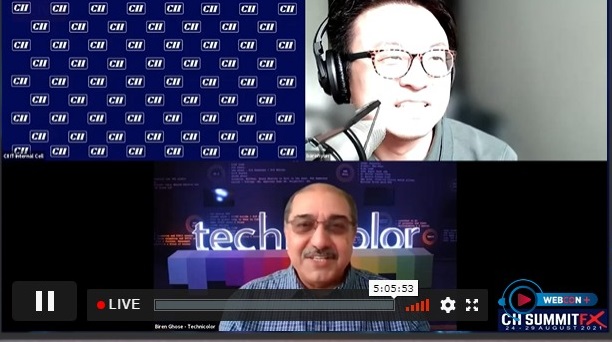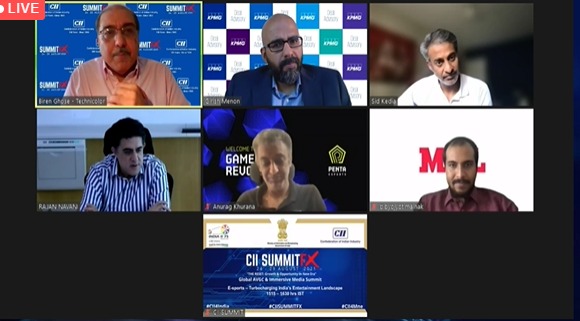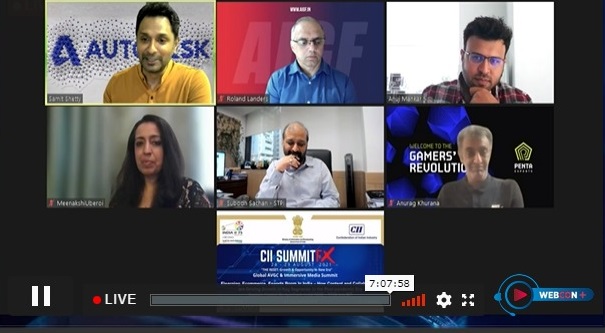
Day two of CII SummitFX 2021 focused on how to build up the skills, emerging opportunities and technological aspects of the AVGC sector.
The first session of the day was titled ‘Special Policy Session on AVGC Sector – Focus on Games & Emerging Verticals‘. Moderated CII National Committee on Media & Entertainment VP and Technicolor India country head Biren Ghose, the session was participated by a mix of policy makers from the government and important stakeholders; the likes of which included Punnaryug Artvision and Screenyug Creations founder & CEO Ashish Kulkarni, Nazara Technologies Manish Agarwal, Mobile Premier League (MPL) SVP, strategy and business operations Naman Jhawar, CII India@75 Council chairman and JetLine Group of Companies vice chairman & managing director Rajan Navani, and Department of Commerce joint secretary Darpan Jain.
While Ghose and Kulkarni laid out a comprehensive set of recommendations for the ministry representatives in attendance, representatives of the government reassured the panelists that important steps are being taken to notch up the AVGC policy.
Education and Skilling for India’s Creative Industry session’s panelists included CII National Committee on media and entertainment vice-chairman, and Technicolor country head Biren Ghose, Ministry of skill development and entrepreneurship Atul Kumar Tiwari, National Institute of Design director Sekhar Mukherjee, Asian Academy of Film and Television and Noida Film City founder and president Sandeep Marwah, Aptech president and executive director Anuj Kacker, Frameboxx Animation and Visual Effects founder and director Rajesh R. Turakhia and Pearl Academy president Aditi Srivastava. The session highlighted the education and skill development for India’s creative Industry.
The next session was ‘Producing at Scale‘ moderated by MPC Film head of productions Kiran Prasad and the panelists included DNEG head of productions Seshaprasad A.R, 88 Pictures COO Aby John and Outpost VFX general manager Sam Thakur.
Prasad started off the session by highlighting how the online media sector has progressed in the past few years. She added, “Past two years had been very difficult, due to a pandemic a lot of things have changed. There is a shift in content consuming behaviour of the viewers. The global online content consumption has doubled from average three hours 17 minutes to six hours 59 minutes as a lot of people switched to online platforms for the content. It is a very positive sign but there has been a lot of trouble in making live action films, but animation and VFX came as support to fill that gap.”

Highlighting the opportunities coming along with the advent of new OTT platforms, Seshaprasad said, “The amount of content consumed through OTT platforms is a global phenomenon. With the advent of multiple online platforms like Netflix, Amazon, Hulu, and Apple there is an increase in content production and consumption, the appetite has been increased. Not only India, many countries are benefiting from this digital platform. India is always historically established for its high quality works so it is the combination of cost, technology, talent which drives new business in India.”
Adding what Seshaprasad said, Thakur explained, “Talent, cost, technology are the tripods of media business, cost is the main factor which makes other countries to consider India as an option. Talent in India is growing and improving and it is a place filled with veterans and fresh talents who are actively involved in delivering quality products. During the pandemic when many productions came to halt, we witnessed how India progressed with the help of technology.”
Talking about the changes and the challenges demand in the market, John said, “If the consumption is driving the demand, the way we consume the media has changed from television to mobile phone. The way we consume media today is far different from the past. India is working towards developing the skill at education level and it is doing far much better than in the past. India is not considered as the first destination but slowly the country is building up its talents and technology.”
The panelist also highlighted various methodologies and improvements to be implemented in the VFX and animation sector to bring in more production and co-ordination among the employees and management will also help in the progress of medium.
The virtual meeting also focused on how work from home brought in a mix of talent and technological challenges and how various departments overcame it and produced a high quality project.
Panelists shared their experience how the blurring of time between official and personal life took a toll on efficiency to complete an overall project. They also highlighted how the AVGC sector and VFX is booming in this time period and how the sector is progressing.
The next session was a fireside chat hosted by CII National Committee on Media & Entertainment vice-chairman and Technicolor India country head Biren Ghose. KPMG Consulting Japan director, digital content advisory, technology, media & telecom and author of Demystifying Esports Baro Hyun was the special guest.
They spoke about how currently in the real world there are so many things that have crippled. Ghose highlighted that due to the pandemic, the esports ecosystem underwent a lot of changes in the traditional model. The two went on to discuss how esports has effectively been brought forward in its trajectory.

Hyun’s presentation was insightful and threw light upon the current trends. He pointed out that despite the covid situation, the esports market is expected to grow to 1790 million USD in 2022, which is a remarkable feat. Statistics also show that the market size in North America, Europe, China is large, and the growth rate tends to be higher in Asia and South America. Whereas, Japan is somewhere in between.
The presentation’s concluding slides indicated that strengthening the governance regarding the management of esports organizations is an indispensable element for ensuring the health of esports and the improvement of its social status.
The next session at the CII Summit was Turbocharging India’s Entertainment Landscape where the panellists of the session were CII’s India@75 Council chairman and JetLine Group of Companies vice chairman and managing director Rajan Navani, Nodwin Gaming CEO Sidharth Kedia, Mobile Premier League (MPL) SVP, policy and legal Dibyojyoti Mainak, Newgen Gaming co-founder & CEO Anurag Khurana, KPMG India head media and entertainment partner, deal advisory Girish Menon and the session was moderated by CII National Committee Media & Entertainment vice-chairman, and Technicolor India country head Biren Ghose.
The panelist discussed various aspects of how the Indian esports system has flourished over the years and how the sector will be climbing new levels going forward. They shed light on how esports is becoming mainstream and how esports tournaments are not just limited to esports but it has become an entertainment event for all.

The speaker highlighted how it is important for Indian esports players doing wonders in the global scale compared to where it started. Gaming is a global language, therefore, for further growth of the esports sector it is crucial to take Indian games and gamers at global scale.
Also like any other sports, esports should reach streets of India like gully cricket and for that it is essential for the Indian esports organisations to be together and focus more on grassroot esports.
There was also a topic of discussion on E-learning, E-commerce, Esports boom in India and how content and collaboration are driving growth in key segments in a post-pandemic era. The panel discussion was moderated by Autodesk India technical solutions manager M&E Samit Shetty. The eminent discussants were STPI director, MD & CEO Subodh Sachan, JetSynthesys Pvt. Ltd gaming VP Anuj Mankar, All India Gaming Federation CEO Roland Landers, Newgen Gaming co-founder and CEO Anurag Khurana, and De Pedagogics – nurturing education, founder CEO & environment evangelist Meenakshi Uberoi.
Shetty commenced the session by mentioning that the world has changed from the letter ‘P’ to ‘E’ – from physical activities, physically shopping, physically learning to Esports, E-learning, E-commerce, and playing games online.

Oberoi, who brought in the educationist perspective, shared how until two years ago, esports was a taboo and it took them a lot of conviction for them to teach the schools that it is something that can be taken to any subject area. The speakers also reflected upon esports being there for a while and how going online has created a platform for more people to participate. Today, people are able to do what they love doing the most, which is playing the game itself and it has become a participatory sport.
The pandemic has been a catalyst for growth of online gaming and esports. Even in the new government policies, the focus has been given to use of technology and collaboration.
Moderated by Accenture associate director, Media, Software & Platforms Industry practice lead Srikanth G Rao, the next panel on ‘Media Tech – The Cloud Imperative‘ that included Zee Network head Enterprise IT and Content Technology Vishal Somani, Serendipity founder Tarun Katial and Desynova co-founder & partner Harish Prabhu saw an insightful discussion on how media cloud can power operational scalability along with business agility to roll out new business models and content.
While Rao touched upon the major shifts that have taken place in the media industry where streaming is no longer a secondary business and media consumption habits are constantly evolving, Somani spoke about the need to bring the stakeholders under one roof and make technology the enabler of the shift.
Citing the YouTube growth story, Katial shared, “Broadcasters took too long to realise that the change was inevitable. Disney woke up to the reality much later than they should have. When you are competing against an established platform like with over 100 million subscribers already, the belief that tech can change the way consumers consume content came in very late. People are moving to linear broadcast and streaming from television.”
This shift that is taking place, informed Prabhu, is being enabled by cloud technology which is much more advantageous than people realise. He shared, “Many companies who were operating in the offline way of operations had to overnight tweak their operations and cloud technology helped them adjust faster or have little disruption in their operation.”
The session concluded with the panelists echoing that while technology will enable the shift, what will always remain at the heart of that change is the user and the way companies can engage the consumer by giving them better experiences.
Overall, the entire day had a lot of takeaways. There are four more days remaining for CII SummitFX 2021, so do make the most it!